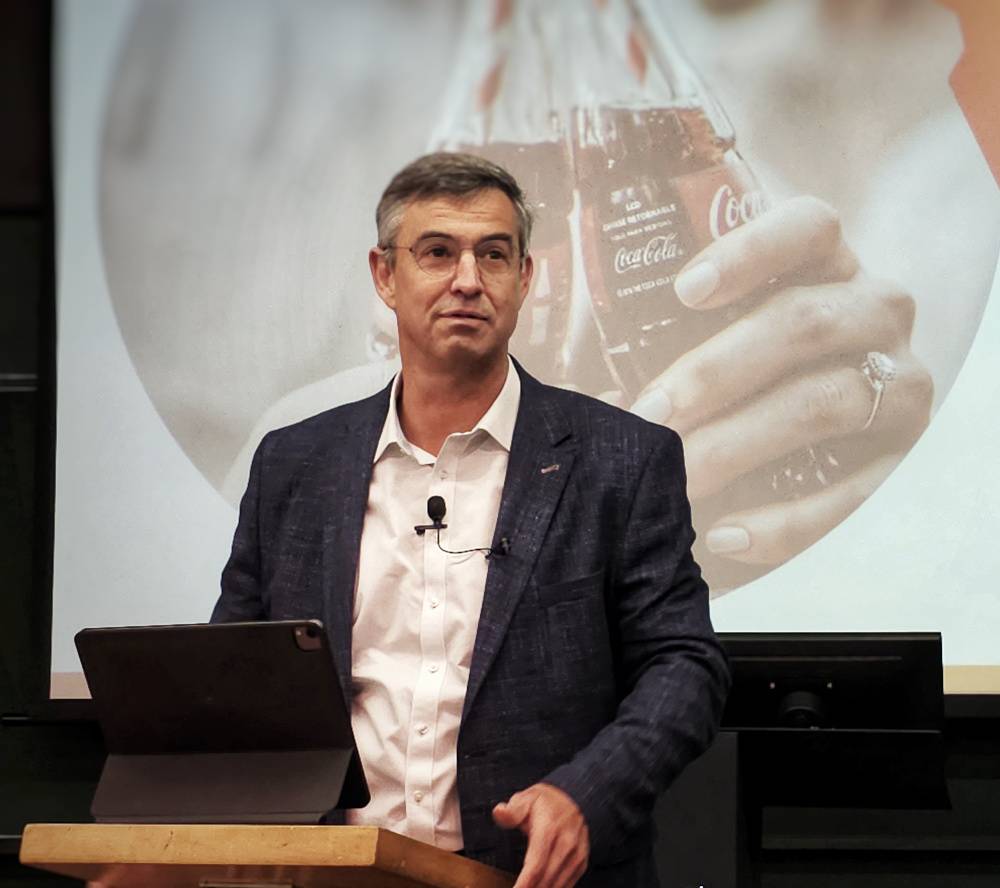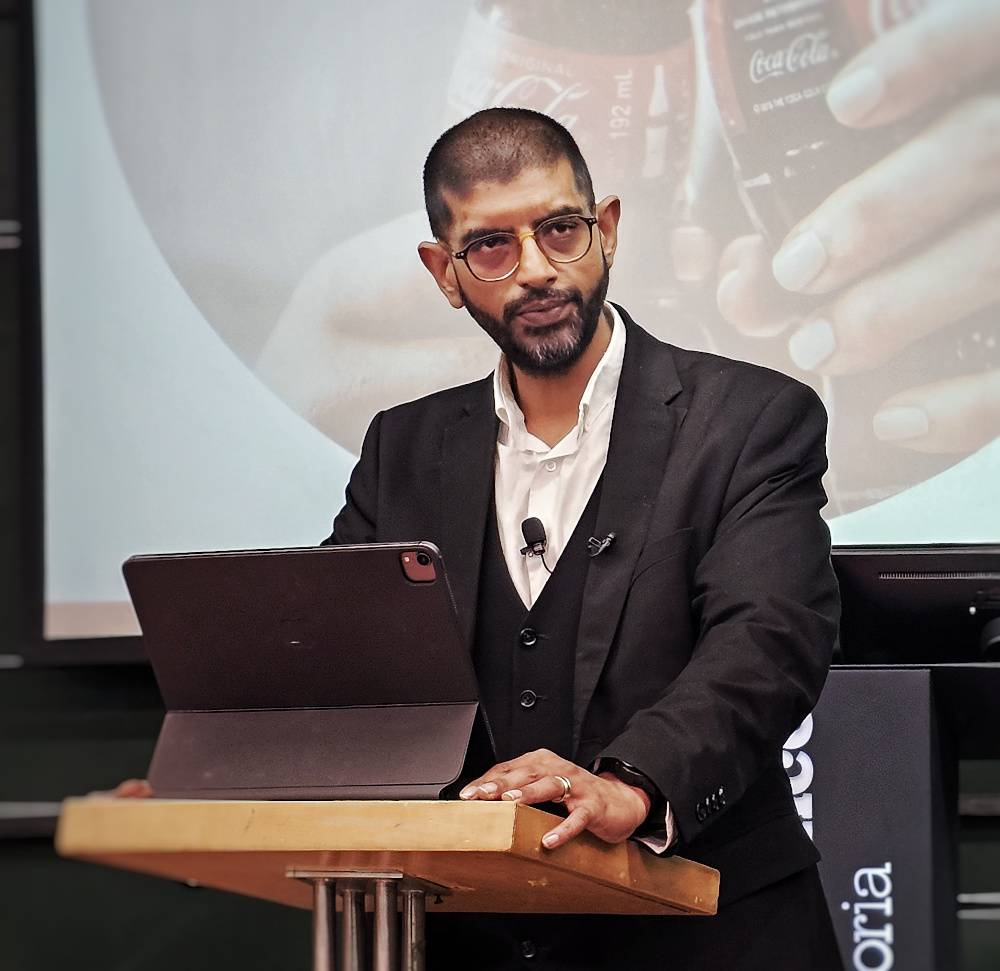Coca-Cola Beverages Africa CEO Jacques Vermeulen (right) engages with Professor Manoj Chiba (left) at the Gordon Institute of Business Science (GIBS) on the circular economy. (Photo: Kofi Zwana)
Coca-Cola Beverages Africa invests in circular economy to promote employment and environmental good
Coca-Cola Beverages Africa (CCBA) is pioneering circular economy initiatives across the continent as part of its commitment to grow sustainably and enable social impact. Speaking at a recent Gordon Institute of Business Science (GIBS) CEO Forum event, CCBA CEO Jacques Vermeulen outlined how the company is working to tackle plastic waste, empower marginalised communities and optimise its operations to drive scale and value for both shareholders and society.
Vermeulen was in conversation with Professor Manoj Chiba, who kicked off the discussion by emphasising the urgency of the climate crisis gripping the world. “The average global temperature over the last three months has been the highest in modern history and addressing climate change is becoming more of a collective responsibility for individuals, organisations and countries,” Manoj urged.
 CCBA CEO Jacques Vermeulen
CCBA CEO Jacques Vermeulen
“The times have changed — this is no longer a problem we can pass on to future generations, because we are already suffering the consequences of past decisions and climate change. Collective responsibility is extremely important as we think about how to live more sustainably.”
In addition to the challenges brought by climate change, Vermeulen noted that this was not the only global crisis underway. “African consumers are also under immense pressure at the moment, spending the highest share of their disposable income on food compared to the residents of other global subregions,” he explained.
“We’ve faced challenges like unemployment, currency devaluation, inflation and even hyperinflation, as well as sluggish economies, but we continue seeking opportunities for sustainable growth and environmental stewardship.”
He said this means CCBA must do what it can to shield consumers from cost increases and contribute wherever it can to support livelihoods and create opportunity across the value chain. It must enable social impact and support environmental stewardship through its operations.
‘The circular waste economy can help solve
Africa’s waste and unemployment challenges’
He added that while CCBA is part of the Coca-Cola system, the company is a fully independent African business that aims to create better shared opportunities across Africa, in the markets where it operates.
With 40 plants and over 17 000 employees across Africa, CCBA is the eighth largest Coca-Cola bottling partner worldwide by revenue and the biggest on the continent, accounting for 40% of all Coca-Cola volumes sold in Africa. The company bottles and distributes products to more than 680 000 outlets in 15 African markets, reaching even the most remote corners of the continent.
With this footprint, said Vermeulen, also comes the responsibility to “grow with a conscience and to conduct business the right way — which means developing better ways to manufacture, distribute and sell our products across Africa”.
This balancing act of profit and purpose starts with the company’s focus on establishing a circular economy around plastic waste and packaging.
Tackling the plastic waste problem with a circular approach
Vermeulen revealed that CCBA has invested heavily in collection systems, recycling infrastructure and multi-sector partnerships to enable waste reuse and recycling.
“The circular economy around waste offers benefits like reducing pollution while creating jobs,” Vermeulen explained. “Integrating marginalised waste collectors into this economy provides income opportunities.”
 Professor Manoj Chiba
Professor Manoj Chiba
This is why CCBA has invested in its African footprint collection systems and recycling infrastructure. In Mozambique, more than 3 000 women have been trained in the safe and efficient collection and sorting of plastic waste, empowering them to earn an income in the plastic waste circular economy. The company has also supported waste collector businesses that have increased plastic recovery rates by ten tonnes a day.
In Uganda, it is empowering women collectors with training, equipment and financing support. “We want to streamline operations, reduce carbon footprint and scale the circular economy so that 100% of waste is collected, recycled or reused by 2030,” he said.
Despite the company’s clear packaging and recycling targets for 2025 and 2030, Vermeulen acknowledged that achieving systemic change requires collaboration and cannot happen in a silo.
Partnering for sustained change
From 2005 to now, PET recycling rates in South Africa rose dramatically from 9 000 tonnes to over 83 000 tonnes annually. This has been driven by industry collaborations such as the one with PETCO in South Africa, voluntary recycling programmes funded through an industry levy and investment in recycling plants. “We’re exploring increased investment in recycling infrastructure to fulfil our commitment that every bottle we put into the market is collected and recycled,” Vermeulen said.
To achieve this, CCBA is combining infrastructure investments with awareness campaigns to promote recycling.
“Extended producer responsibility [EPR] policies are also vital drivers of the circular economy, and South Africa already made EPR mandatory in 2021, building on the voluntary model we initiated,” he explains. “We also work with regional bodies to roll out EPR policies more broadly across Africa.”
Transitioning from linear to circular systems requires reimagining packaging, business models, supply chains and changing consumer behaviours: “Partnerships and individual actions are crucial for driving systemic change. We work with our critics, competitors, NGOs, and governments to accelerate progress. However, changing human behaviour and building recycling discipline remains challenging. A lot still hinges on individual responsibility. Plastic is not the enemy; human behaviour and how we treat plastic is. It starts with us as individuals. We’ve got to model the human behaviour we want to see.”
Recycling must become second nature, with people viewing waste as a resource instead of rubbish. Governments also have a crucial role to play in enabling recycling infrastructure and regulations.”Leading by example and influencing family and friends is essential,” Vermeulen said. “We must make it easy and build discipline to use recycling infrastructure correctly.”
Stepping into tomorrow
CCBA aims to not just recycle but also reuse packaging and has invested in returnable glass bottle programmes, as well as returnable 2-litre PET drink bottles.
“Looking ahead, priorities include supply chain efficiency, decarbonisation and scaling the circular economy further through cross-industry collaboration,” he said.
Looking ahead, Vermeulen expects CCBA’s circular economy initiatives to continue gathering speed. “In the next five years, we will be far more structured and developed around recycling,” he promised, adding that priorities include streamlining operations, reducing carbon footprints, and scaling up waste collection and recycling through cross-industry collaboration.
As technology advances, so do the possibilities for packaging. New bio-based and biodegradable solutions as alternatives to plastic are not far off, and while the company is exploring bio-based materials, Vermeulen acknowledged that these remain challenging to scale economically. “However, technology is advancing so quickly, it would be naive to think plastic bottles will exist unchanged in our lifetime. In South Africa, our 500ml Bonaqua bottles are already made out of 100% recycled PET [Polyethylene terephthalate, the most recyclable plastic].”
CCBA offers hope that even mammoth challenges like plastic waste can be overcome when companies employ their scale intentionally, engage stakeholders broadly and keep society’s interests at heart. Vermeulen concluded: “If we get individuals, organisations and governments pulling together, we can build the discipline and infrastructure for comprehensive recycling. There is huge opportunity across Africa.”
The opportunity in the circular economy can help solve Africa’s waste and unemployment challenges, stimulate entrepreneurship and innovation, and ensure a better future for all. With collective and sustained effort, a circular economy that unlocks social and environmental good — and a world without waste — is within reach.